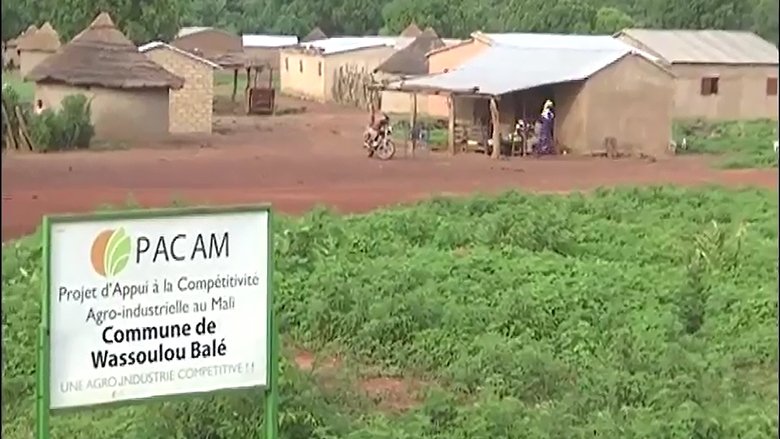Challenge
The agricultural sector in Mali is highly fragmented, and subsistence farming is the dominant model. The majority of farm holdings are small. A large part of the rural road network in the agricultural production basin is impassable during the rainy season, hindering producers from accessing urban and export markets.
Independent smallholders remain largely disconnected from markets due to low levels of organization and capacity, and they are typically not integrated into export-ready value chains. Also, they do not have direct access to markets.
Investments in the agriculture sector are very low. Agricultural credit comprises only 5.49 percent of overall private sector credit, most of which goes to finance the cotton sector.
Approach
The project has focused on mango and quality beef. It has promoted commercial agriculture, helping farmers adopt modern practices and technologies. The project also helped to expand market opportunities for beef producers by facilitating alliances with buyers and related industries.
Results
The project directly supports the priorities of the Mali Country Partnership Strategy for the fiscal years 2016-2019 (extended to fiscal year 2021), including the creation of economic opportunities and the unlocking of private sector investments. Strengthening linkages among the various actors in the value chain led to better prices and incentives for farmers to increase their productivity. Additionally, rural road rehabilitation in production areas has led to benefits for the broader community, such as better access to basic services, including education and health.
As of December 31, 2021, the project had contributed to increasing mango exports by helping farmers improve productivity and mango quality and expand their access to markets. It also contributed to building and enhancing the quality beef value chain. Key results achieved by the project include:
- The project supported the processing of 18,635 tons of mango against an initial target of 16,000 tons, with a baseline line of 6,000 tons. Due to trade disruptions, mango exports are expected to reach 37,420 tons by project closing (December 2022) as compared to the final project target of 49,000 tons. The PACAM supported two phytosanitary campaigns* against the fruit fly on 34,800 hectares of land, which helped to improve the quality and quantity of the mangoes produced.
- The project helped to mitigate the risk of private sector investments. Currently, larger mango processing companies, including Mali’s leading mango processor, the Center for Study and Industrial and Agricultural Development of Mali (Centre d'Étude et de Développement Industriel et Agricole du Mali, CEDIAM), source their mangoes from the producers supported by the project.
- Over 300 km of rural roads were rehabilitated, directly benefitting 70 villages in the circles of Sikasso and Yanfolila, and connecting mango-producing areas to neighboring markets.
- Six collection centers with a capacity of 75 tons each have been built or rehabilitated. They are dedicated to mangos, but they can also be used for other agricultural products outside the mango season.
- Regarding the beef value chain, the project forged 48 productive alliances between local beef producers, the PACAM, the National Bank for Agricultural Development (Banque Nationale de Développement Agricole), and Laham Industries (Mali’s first modern slaughterhouse). The project also contributed to building key infrastructure, such as animal houses and water wells. In addition, it was complemented by the provision of veterinary support through the World Bank-supported Livestock Sector Development Support Project for Mali (PADEL-M).
- The project is a good example of joint World Bank and International Finance Corporation (IFC) collaboration. The IFC invested in CEDIAM, and provided it and Laham Industries with technical assistance to obtain international export certifications.
World Bank Group Contribution
The project is financed through a $30 million credit from the International Development Association (IDA). It has also benefited from an IFC investment of Euros 1.5 million to the CEDIAM company, as well as the provision of technical assistance on international certifications needed for exporting (HACCP and ISO 2000). As a result, both CEDIAM and Laham Industries acquired these certifications.
Partners
- The project is implemented by the Malian Ministry of Rural Development Agriculture. The National Bank of Mali (Banque Nationale du Mali, BNDA) provided beef producers with credit lines to purchase cattle.
- Laham Industries entered into agreements with individual beef producers to purchase cattle.
- The Investment Promotion Agency supported the beef fatteners in developing business plans through which they were able to access credit lines from BNDA. It also promoted Mali-grown mangos to investors and international buyers.
- Other local agencies helped the project to succeed, including the National Directorate for Roads (supervision of and guidance on roads works), the Regional Directorate for the Control of Pollution and Nuisances (assistance in training producers in the use of pesticides and in the collection of harmful packaging), the National Directorate for Industry (collection of statistics), the National Directorate for Veterinary Services (assistance in the training of beef producers in the veterinary follow-up of the animals to be purchased by Laham Industries).
Looking Ahead
To ensure sustainability, the PACAM involved local authorities in its management and governance from the early stages. Additionally, road maintenance is included in the Malian authorities’ formal work plans, including a dedicated budget. The project also continues to support the professional association of the mango sector in determining a longer term sustainability strategy A new World Bank operation is planned to scale up the results of this project.
Beneficiary Story/Quote
* The campaigns included treatment of mango orchards with organic pesticides against the mango fruit fly that threatens the harvest and export of mangoes. Following the detection of the presence of the fruit fly in several containers destined for Europe, Malian mangoes were threatened with a ban on exports to this market.

